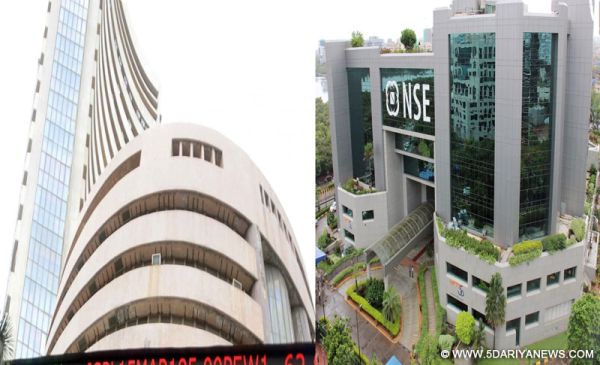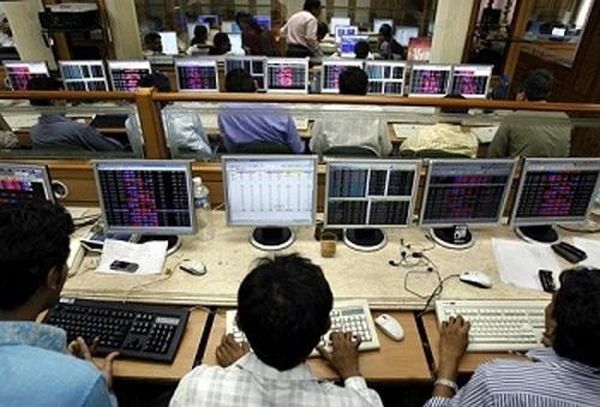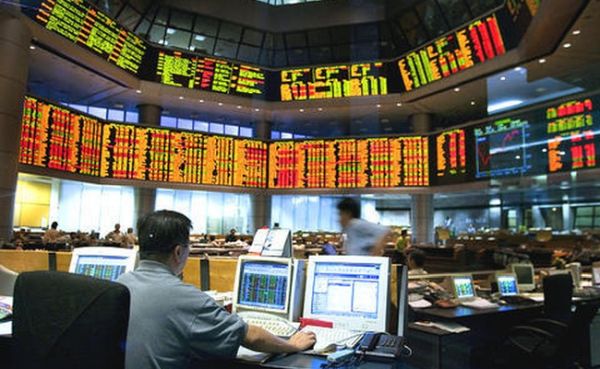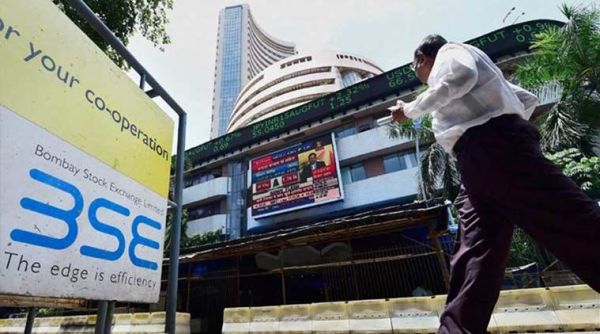
by admin | May 25, 2021 | Economy, Markets, News
 By Rituraj Baruah,
By Rituraj Baruah,
Mumbai : A healthy rise in the country’s GDP, along with predictions of a normal monsoon and easing crude oil prices fuelled a nearly one per cent rise in the key Indian equity indices during the just concluded trade week.
Accordingly, the two key indices — NSE Nifty50 and the S&P BSE Sensex — ended on a positive note for the second consecutive week.
However, geo-political tensions and resurgent concerns over a trade war between the US and China kept the global markets largely volatile and had a cascading impact on the domestic bourses.
Nonetheless, the barometer 30-scrip Sensitive Index (Sensex) of the BSE rose by 302.39 points or 0.87 per cent to close at 35,227.26 points on a weekly basis.
The wider Nifty50 of the NSE closed the week’s trade at 10,696.20 points — up 91.05 points or 0.86 per cent — from its previous close.
Despite the indices’ northward trajectory, market breadth was negative in four out of the five trading sessions of the week, analysts said.
“Markets ended the week building on with modest gains after a sharp bounce back from the lows of 10,417 towards the end of the previous week,” said Deepak Jasani, Head, Retail Research, HDFC Securities.
“It was thus the second consecutive week of gains for the Nifty after the sharp correction seen recently.”
Hem Securities’ Director Prateek Jain said: “Falling crude oil prices helped equity markets to gather steam in the later part of the week. Development in Italy and Euro zone caused a scare but thankfully it was resolved soon and the market resumed its rally higher.”
According to Jain, on the currency front, easing crude oil prices resulted in appreciation of the rupee.
The rupee strengthened by 72 paise to close at 67.06 against the US dollar from its previous week’s close of 67.78 per greenback.
In terms of investments, provisional figures from the stock exchanges showed that foreign institutional investors sold scrips worth Rs 2,707.41 crore, while the domestic institutional investors purchased stocks worth Rs 2,160.44 crore during the week.
Figures from the National Securities Depository (NSDL) revealed that foreign portfolio investors (FPIs) divested equities worth Rs 2,756.63 crore, or $405.08 million, in the week ended June 1.
Sector-wise, the top gainers were the auto, banking and energy stocks. The top losers were media, IT and realty indices, Jasani said.
The top weekly Sensex gainers were Coal India (up 6.56 per cent at Rs 294.15); Mahindra and Mahindra (up 5.16 per cent at Rs 901.55); HDFC Bank (up 4.87 per cent at Rs 2,109.55); Bajaj Auto (up 4.83 per cent at Rs 2,893.25); and Sun Pharma (up 3.50 per cent at Rs 482.90 per share).
The major losers were Tata Consultancy Services (down 3.48 per cent at Rs 1732.25); Power Grid (down 2.85 per cent at Rs 205.90); Tata Motors (down 2.38 per cent at Rs 287.20); ICICI Bank (down 2.36 per cent at Rs 289.50); and Wipro (down 1.70 per cent at Rs 260.45 per share).
(Rituraj Baruah can be contacted at rituraj.b@ians.in)
—IANS

by admin | May 25, 2021 | Economy, Markets, News
 By Porisma P. Gogoi,
By Porisma P. Gogoi,
Mumbai : A global sell-off triggered by trade protectionist measures imposed by major world economies unleashed the bears in the Indian equity markets during the week, pushing the key indices — NSE Nifty50 and BSE Sensex — to their 5-month lows.
Apart from the prospects of escalating trade wars, the risk-taking appetite of investors was marred by rising crude oil prices, the ongoing turmoil in the domestic banking system as well as the uncertainty on the political situation in the country.
On a weekly basis, the barometer 30-scrip Sensitive Index (Sensex) of the BSE shed 579.46 points or 1.75 per cent to close at 32,596.54 points — its lowest closing level since October 23, 2017.
On the National Stock Exchange (NSE), the wider Nifty50 ended below the psychologically important 10,000-mark and closed trade at 9,998.05 points — down 197.1 points or 1.93 per cent from its previous week’s close — its lowest closing level since October 11, 2017.
“Benchmark indices Sensex and Nifty fell 1.75 per cent and 1.93 per cent respectively during the week, posting their longest stretch of weekly losses in 16 months as the domestic market joined a global sell-off triggered by prospects of a trade war,” Arpit Jain, Assistant Vice President at Arihant Capital Markets, told IANS.
According to D.K. Aggarwal, Chairman and Managing Director of SMC Investments and Advisors, the global stock market traded lower after US President Donald Trump announced sweeping tariffs on Chinese goods, a move that has heightened concerns that the global trade war will escalate.
“Back at home, dragged by escalating trade tensions among global economies, the Indian stock market too witnessed selling pressure amid other domestic factors. Since the beginning of the year domestic market witnessed some hiccups on the back of imposition of LTCG (long term capital gains) tax, liquidity issues, rising bond yields and volatile global markets,” Aggarwal told IANS.
“Also, a surge in crude oil prices impacted the market sentiment. The Indian rupee, too, witnessed a volatile move ahead of Fed rate-hike and global trade war concerns,” he added.
On the currency front, the rupee weakened by eight paise to close at 65.01 against the US dollar from its previous week’s close at 64.93.
“Sentiments were affected by rising crude oil prices, bond yields and a troubled domestic banking system. Uncertainty around the political situation in the country added to the woes, and collectively dragged the sentiment across the street,” Gaurav Jain, Director at Hem Securities, told IANS.
Provisional figures from the stock exchanges showed that foreign institutional investors purchased scrips worth Rs 2,524.13 crore and the domestic institutional investors (DIIs) scrips worth Rs 211.91 crore during the week.
Figures from the National Securities Depository (NSDL) revealed that foreign portfolio investors invested in equities worth Rs 2,060.04 crore, or $316.99 million, during March 19-23.
“The market breadth was negative in three out of the five trading sessions of the week. The top sectoral losers were realty, metal, Bank Nifty and pharma indices. There were no gainers,” said Deepak Jasani, Head – Retail Research, HDFC Securities.
The top weekly Sensex gainers were: NTPC (up 2.90 per cent at Rs 170.15); IndusInd Bank (up 1.36 per cent at Rs 1,750.20); Power Grid (up 1.04 per cent at Rs 194.25); Hindustan Unilever (up 0.05 per cent at Rs 1,299.75); and Larsen and Toubro (up 0.01 per cent at Rs 1,267.75).
The losers were: Yes Bank (down 8.37 per cent at Rs 286.70); ICICI Bank (down 7.48 per cent at Rs 275.80); State Bank India (down 7.13 per cent at Rs 234.60); Tata Steel (down 5.65 per cent at Rs 566.60); and Axis Bank (down 4.29 per cent at Rs 501).
(Porisma P. Gogoi can be contacted at porisma.g@ians.in)
—IANS

by admin | May 25, 2021 | Economy, Markets, News
 By Porisma P. Gogoi,
By Porisma P. Gogoi,
Mumbai : Release of key domestic macro-economic data, combined with global market volatility and movement of funds, are expected to dictate the direction of the Indian equity markets during the week ahead, say market analysts.
“Apart from other developments on the domestic front, the Indian equity markets would seek direction from global markets as the results (earnings) season is almost over,” D.K. Aggarwal, Chairman and Managing Director of SMC Investments and Advisors, told IANS.
“Also, the movement of funds and crude oil prices are expected to influence the market sentiment next week,” he added.
Provisional figures from the stock exchanges showed that last week foreign institutional investors (FIIs) sold off scrips worth Rs 5,781.98 crore, while domestic institutional investors (DIIs) purchased scrips worth Rs 5,972.69 crore.
Figures from the National Securities Depository (NSDL) revealed that foreign portfolio investors (FPIs) off-loaded equities worth Rs 3,054.94 crore, or $468.06 million, from February 20 to 23.
“On the macro front, fiscal deficit data, core sector data for January and estimates for October-December GDP (gross domestic product) data will be announced on February 28. Automobile sales data by automakers and Nikkei Manufacturing PMI (Purchasing Manager’s Index) for February will be announced on March 1,” Arpit Jain, Assistant Vice President at Arihant Capital Markets, told IANS.
In addition, the Central Statistics Office (CSO) is expected to release the macro-economic data points of Index of Industrial Production (IIP) on February 28.
According to Vinod Nair, Head of Research, Geojit Financial Services, investors will wait for fresh triggers to get direction in the week ahead.
“As per the quarter results, the corporate earnings have started to pick up but concern on inflation and hike in interest rate may add pressure on the near-term valuation,” said Nair.
“The sustainability in the global market is another key factor which may influence domestic investors’ sentiments,” he added.
Analysts were optimistic that the upcoming week could witness a recovery of the key indices from lower levels.
“Nifty and Sensex made a strong come-back post the bad expiry series for February, closing above the 10,490 and 34,000 marks, respectively, on the first day of March derivative series on February 23,” said Dhruv Desai, Director and Chief Operating Officer of Tradebulls.
“Therefore we believe that the final week of February should see a termination of the down move and a reversal sign is in the offing which could turn the tide in favour of bulls soon,” Desai told IANS.
Last week, the key Indian equity indices bounced back from their lows to close with humble gains on value buying by investors after three weeks of consecutive losses.
On a weekly basis, the barometer 30-scrip Sensitive Index (Sensex) of the Bombay Stock Exchange (BSE) edged higher by 131.39 points or 0.39 per cent to close at 34,142.15 points.
The wider Nifty50 of the National Stock Exchange (NSE) closed trade at 10,491.05 points — up 38.75 points or 0.37 per cent from its previous week’s close.
The equity markets will remain closed on March 2 (Friday) for Holi.
(Porisma P. Gogoi can be contacted at porisma.g@ians.in )
—IANS

by admin | May 25, 2021 | Economy, Markets, News
 Mumbai : Positive global indices, coupled with healthy buying in capital goods, auto, banking, healthcare and metal stocks, lifted the key Indian equity indices on Monday.
Mumbai : Positive global indices, coupled with healthy buying in capital goods, auto, banking, healthcare and metal stocks, lifted the key Indian equity indices on Monday.
Market observers said investors awaited the retail and industrial inflation data due to be announced in the evening which is expected to give direction to the central bank’s next course of action on raising interest rates.
The wider Nifty50 of the National Stock Exchange held the 10,500-mark and closed higher by 84.80 points or 0.81 per cent at 10,539.75 points.
On the BSE, the barometer 30-scrip Sensitive Index (Sensex) closed at 34,300.47 points — up 294.71 points or 0.87 per cent from its previous close.
The Sensex touched a high of 34,351.34 points and a low of 34,115.12 points during the intra-day trade.
The BSE market breadth was bullish as 2,050 stocks advanced as against 764 declines.
In terms of the broader markets, the S&P BSE mid-cap index edged higher by 1.31 per cent and the small-cap index by 1.60 per cent.
“Markets bounced back on Monday after the correction seen on last Friday. The gains came on the back of strong global cues,” Dhruv Desai, Director and Chief Operating Officer of Tradebulls, told IANS.
“Major Asian markets closed on a positive note, barring the Hang Seng index. European indices like FTSE 100, DAX and CAC 40 traded in the green,” he added.
Last week on Friday, the key equities had plunged into the negative territory amid a global sell-off, with the Sensex shedding 407.40 points or 1.18 per cent and the Nifty50 was down 121.90 points.
Vinod Nair, Head of Research, Geojit Financial Services, said: “On Monday, market reversed from previous day’s losses owing to positive global cues and expectation of marginal decline in January CPI (Consumer Price inflation) inflation today.”
“Mid and small-caps outperformed the benchmark indices as investors start accumulating the over sold stocks. The economy is forecast to improve in the long-term with strong earnings growth which is likely to provide a safety to the ongoing consolidation,” he added.
The Central Statistics Office (CSO) is slated to release the macro-economic data points of the CPI and IIP (Index of Industrial Production) on Monday evening.
On the currency front, the Indian rupee strengthened by nine paise to close at 64.31 against the US dollar from its previous close at 64.40.
In terms of investments, provisional data with the exchanges showed that foreign institutional investors sold scrips worth Rs 814.11 crore while domestic institutional investors bought stocks worth Rs 1,342.70 crore.
Sectorwise, the S&P BSE capital goods index surged by 317.88 points, followed by auto index by 266.55 points and banking index by 197.62 points.
On the other hand, the S&P BSE IT index edged lower by 52.47 points and the Teck (technology, media and entertainment) index by 22.59 points.
Major Sensex gainers on Monday were: Tata Steel, up 4.22 per cent at Rs 712.50; Yes Bank, up 2.89 per cent at Rs 334.95; Power Grid, up 2.51 per cent at Rs 198.05; IndusInd Bank, up 2.12 per cent at Rs 1,686.45; and Hero MotoCorp, up 1.94 per cent at Rs 3,615.
Major Sensex losers were: State Bank of India, down 2.67 per cent at Rs 288.50; Infosys, down 0.72 per cent at Rs 1,103.80; ITC, down 0.53 per cent at Rs 269.85; Mahindra and Mahindra, down 0.43 per cent at Rs 746.70; and ICICI Bank, down 0.23 per cent at Rs 326.
The Indian equity markets will remain closed on Tuesday (February 13) for Mahashivratri.
—IANS

by admin | May 25, 2021 | Economy, Markets, News
 By Porisma P. Gogoi,
By Porisma P. Gogoi,
Mumbai : Key Indian equity indices — the BSE Sensex and the NSE Nifty — witnessed further correction and closed lower by almost two per cent during the week ended Friday, as persistent outflow of foreign funds on the back of a weak rupee, coupled with geo-political risks, suppressed investors’ sentiments.
However, the indices pared most of their losses towards the later half of the week and closed on a flat note as sentiments were buoyed by continous pumping in of funds by domestic institutional investors (DIIs) and bargain hunting.
On a weekly basis, the 30-scrip Sensitive Index (Sensex) of the BSE plunged by 638.72 points or two per cent to close at 31,283.72 points.
Similarly, the Nifty50 of the National Stock Exchange (NSE) receded by 175.8 points or 1.76 per cwent to close the week’s trade at 9,788.60 points.
“Carrying on from last week, markets continued to correct further this week. A bounce back towards the end of the week helped to curb the losses,” Deepak Jasani, Head – Retail Research, HDFC Securities, told IANS.
“Sectorally, the top gainers were the metal, realty and auto indices. The top losers were the PSU banks, pharma and FMCG indices,” he added.
According to Dhruv Desai, Director and Chief Operating Officer of Tradebulls, the Indian markets snapped a seven-day losing streak on September 28 and ended with modest gains as traders covered their short positions on the eve of September series derivative expiry.
Market observers pointed out that the seven-day fall was the longest losing streak for the indices after a nine-day fall that occurred during December 13-26, 2016.
“The geo-political wave continued for yet another week, this time from Indian forces taking military action against militant’s hideouts in Myanmar,” Desai told IANS.
D.K. Aggarwal, Chairman and Managing Director, SMC Investments and Advisors, said: “In the week gone by, investors sold equities on the back of geo-political concerns between the US and North Korea. Strong words got exchanged between the two countries, increasing the possibility of a war-like situation.”
“Back at home, concerns pertaining to the possibility of fiscal slippage on the possibility of fiscal stimulus to boost growth receded with government announcing that it will stick to the budget plan,” Aggarwal told IANS.
On the currency front, the Indian rupee weakened by 49 paise to close the week at 65.29 to a US dollar from its previous week’s close at 64.80.
“During the week, weakness in the indices continued with rupee becoming weak and crude oil prices rising,” said Anita Gandhi, Whole Time Director at Arihant Capital Markets.
“FIIs (foreign institutional investors) continued to be net sellers in the Indian equities, however DIIs gave good support with positive flows,” Gandhi added.
Provisional figures from the stock exchanges showed that FIIs continued with their selling spree and off-loaded stocks worth Rs 10,896.59 crore during the week, whereas the DIIs bought scrip worth Rs 11,666.60 crore.
Figures from the National Securities Depository (NSDL) revealed that foreign portfolio investors (FPIs) divested equities worth Rs 5,899.95 crore, or $897.14 million, during September 25-29.
The top weekly Sensex gainers were: Coal India (up 6.58 per cent at Rs 270.60); ONGC (up 3.77 per cent at Rs 170.65); Bajaj Auto (up 2.16 per cent at Rs 3,105); Power Grid (up 1 per cent at Rs 211.85); and Axis Bank (up 0.98 per cent at Rs 510).
The losers were: Asian Paints (down 8.07 per cent at Rs 1,117.05); Adani Ports (down 6.01 per cent at Rs 377.15); Hindustan Unilever (down 5.20 per cent at Rs 1,175.15); Dr. Reddys Lab (down 5.18 per cent at Rs 2,329.40); and Wipro (down 4.46 per cent at Rs 280.95).
(Porisma P. Gogoi can be contacted at porisma.g@ians.in)
—IANS





